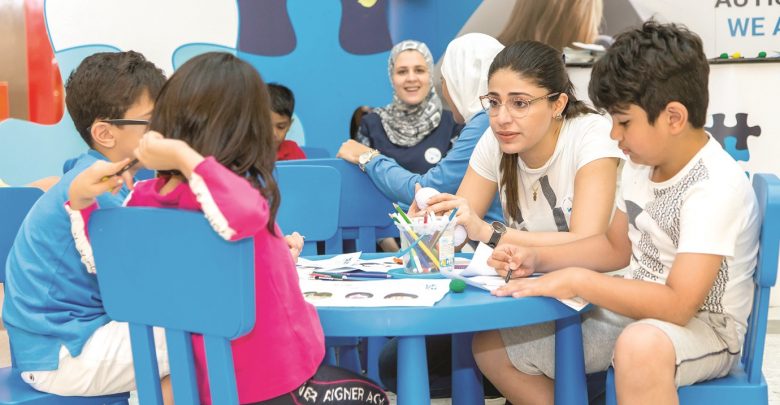
1:14% prevalence of autism spectrum disorder rate in Qatar
١٫١٤% معدل انتشار اضطراب طيف التوحد في قطر
A two-phase study on the prevalence of Autism Spectrum Disorder (ASD) in the country by Qatar Biomedical Research Institute (QBRI), part of Hamad Bin Khalifa University, has revealed that 1.14% or one in 87 children suffer from ASD.
The six-year study was the first of its kind in Qatar and the Gulf region, it was announced Tuesday. From the results, and based on the 2016 census, the study estimates that about 4,791 individuals in Qatar between the ages of one and 20 have ASD with one in 56 boys and one in 230 girls being affected.
The results of the study were recently published in the Journal of Child Psychology and Psychiatry, the official journal of the UK-based Association for Child and Adolescent Mental Health.
The study was carried out by QBRI’s Neurological Disorders Research Centre (NDRC), which focuses on investigating the increasing prevalence of neurological disorders in Qatar and the region.
Dr Fouad al-Shaban, a senior scientist at NDRC, spearheaded the research, to estimate the prevalence of ASD among Qatari families and other families in Qatar and establish an autism database and disease registry.
Dr al-Shaban said: “The study is the first of its kind that set about to determine the prevalence of autism in Qatar and the region. It is our hope that the outcomes will be used to inform future studies on autism.
“Phase 1 of the study involved the screening of 9,074 primary school students aged 5 to 12 years from 93 public and private schools by using the Social Communication Questionnaire screening tool after translation and validation to the Arabic language. Phase 2 extended the study to include hospitals and special needs centres offering services to individuals with ASD, such as Rumailah Hospital and Al Shafallah Centre for Persons with Disabilities, the two primary government centres engaged in the study. Both phases reflect similar prevalence rates of approximately 1.146%.”
“Although the consanguinity rate is around 52% across the GCC and Middle East, our findings don’t show a significant correlation between consanguinity and the prevalence rate of ASD in Qatar; which is supported by the fact that ASD is a multi-genetic disorder with no direct causal link to consanguinity. Meanwhile, the study found that consanguinity is related to the severity of ASD,” added Dr al-Shaban.
Overall, the study found the prevalence of ASD in Qatar to be higher than the World Health Organisation average of 0.6 to 1% although the study variables and methodology may vary.
Dr Omar El-Agnaf, executive director of QBRI, said: “The success and findings of this study is testament to what can be achieved through a collective vision to spearhead research that will pave the way for advancements in healthcare.”
These findings have enabled researchers, in collaboration with the Ministry of Public Health, to create and complete Qatar’s first autism registry using the data of 1,300 individuals with ASD, which will be made available to researchers with a particular interest in neurological disorders.
The results of the study also provide crucial data that will enable the country and its policymakers to work towards adequate healthcare planning and make provisions for specialised healthcare centres, and the necessary capacity building for individuals with autism.
Amal bint Abdullatif al-Mannai, chief executive officer of Qatar Foundation for Social Work, said: “It was an honour for Al Shafallah to be able to participate in the groundbreaking study, providing researchers from QBRI with access to invaluable data to drive the study. The screening has revealed fascinating insights that will make tremendous contributions to the future provisions of adequate healthcare for those with autism and other neurological disorders.”
“The findings of the study will provide valuable data, which will help us develop a personalised and sustainable healthcare strategy to address the specific needs of those individuals with autism,” added Dr Saleh bin Ali al-Marri, assistant minister at the health ministry.
أصدر معهد قطر لبحوث الطب الحيوي -التابع لجامعة حمد بن خليفة- نتائج دراسته المكثفة التي استمرت لمدة ست سنوات حول انتشار اضطراب طيف التوحد في قطر، وهي الدراسة الأولى من نوعها التي تُجرى في قطر ومنطقة الخليج.
وأجرى مركز بحوث الاضطرابات العصبية التابع للمعهد، الذي يركز على دراسة الانتشار المتزايد للاضطرابات العصبية في قطر والمنطقة، بما في ذلك حالات اضطراب طيف التوحد، هذه الدراسة المهمة.
وترأس الدكتور فؤاد الشعبان -عالم أول بمركز بحوث الاضطرابات العصبية التابع للمعهد- هذه الدراسة البحثية غير المسبوقة، التي استهدفت تقييم انتشار اضطراب طيف التوحد بين العائلات القطرية والعائلات الأخرى المقيمة في قطر، وإنشاء قاعدة بيانات للتوحد وسجل للمرض. وقد طُوِرت قاعدة البيانات لتقديم بيانات وصفية حول التصنيف والتنميط الظاهري للسكان من الأطفال الذين شُخّصت إصابتهم باضطراب طيف التوحد، وتقييم أثر بعض عوامل الخطر على معدل انتشار هذا الاضطراب. وكشفت نتائج الدراسة، التي أجريت على مرحلتين، عن أن معدل انتشار اضطراب طيف التوحد في قطر بلغ 1.14 % أو حالة إصابة واحدة من بين كل 87 طفلاً؛ بمعدل حالة إصابة بين كل 56 ولداً وحالة واحدة بين كل 230 بنتاً.
وحسبما يتضح من النتائج، وبناءً على تقديرات تعداد سكان دولة قطر لعام 2016، أشارت تقديرات الدراسة إلى إصابة 4.791 فرداً تقريباً بدولة قطر في المرحلة العمرية من 1 – 20 باضطراب طيف التوحد.
ونُشرت نتائج الدراسة، مؤخراً، في دورية علم نفس الطفل والطب النفسي، وهي دورية دولية مرموقة متخصصة في علم نفس الأطفال والمراهقين والطب النفسي، كما أنها الدورية الرسمية لجمعية الصحة النفسية للأطفال والمراهقين، التي تتخذ من المملكة المتحدة مقراً لها. وبهذه المناسبة، قال الدكتور فؤاد الشعبان: «هذه الدراسة هي الأولى من نوعها التي تسعى إلى تحديد انتشار التوحد في قطر والمنطقة. ونحن فخورون بإتاحة نتائج الدراسة للمجتمع الطبي الدولي، ونأمل في أن تُستخدم نتائج الدراسة لتعزيز الدراسات المستقبلية حول التوحد». واشتملت المرحلة الأولى من الدراسة على فحص 9074 طالباً من طلاب المدارس الابتدائية في المرحلة العمرية ما بين 5 – 12 عاماً من المدارس العامة والخاصة، باستخدام أداة فحص في شكل استبيان للتواصل الاجتماعي بعد ترجمته إلى اللغة العربية واعتماده. ووسّعت المرحلة الثانية من نطاق الدراسة لتشمل المستشفيات ومراكز الاحتياجات الخاصة التي تقدّم الخدمات للمصابين باضطراب طيف التوحد، مثل مستشفى الرميلة، ومركز الشفلح للأشخاص ذوي الإعاقة، وهما المركزان الحكوميان الأوليان المشاركان في الدراسة. وعكست كلتا المرحلتان معدلات انتشار مشابهة بلغت 1.146 % تقريباً.
إنشاء أول سجل للتوحد
مكّنت هذه النتائج الباحثين من إنشاء أول سجل للتوحد في قطر واستكماله، بالتعاون مع وزارة الصحة العامة، باستخدام البيانات الخاصة بـ 1.300 شخص من المصابين باضطراب طيف التوحد.
وسوف يُتاح هذا السجل للباحثين الذين لديهم اهتمام خاص بالاضطرابات العصبية.
وتوفر نتائج الدراسة كذلك بيانات حيوية ستُمكّن دولة قطر وصنّاع السياسات من العمل على التخطيط بكفاءة لتعزيز نجاحات قطاع الرعاية الصحية، وتوفير مخصصات لمراكز الرعاية الصحية المتخصصة، وبناء القدرات الضرورية للأشخاص المصابين بالتوحد.
وقد أُجريت هذه الدراسة بالتعاون مع شركاء وطنيين ودوليين، من بينهم مؤسسة حمد الطبية، ومركز الشفلح للأشخاص ذوي الإعاقة، وجامعة قطر، ومؤسسة كليفلاند كلينيك الأميركية، وجامعة أوريغون للصحة والعلوم في الولايات المتحدة الأميركية.
المزيد من التقدم في قطاع الرعاية الصحية
قال الدكتور عمر الأجنف، المدير التنفيذي لمعهد قطر لبحوث الطب الحيوي: «نحن فخورون للغاية بجهود جميع الأشخاص الذين قدّموا الدعم لمعهد قطر لبحوث الطب الحيوي في إجراء هذه الدراسة منذ بدايتها؛ فقد ساهم الدعم السخي الذي تلقيناه من الصندوق القطري لرعاية البحث العلمي في دفع جهودنا البحثية وتيسير سبل إجراء هذه الدراسة غير المسبوقة. ويُقدم نجاح هذه الدراسة والنتائج المهمة التي توصلت إليها شهادة على ما يمكن تحقيقه من خلال رؤية جماعية لإجراء أبحاث تمهّد الطريق لتحقيق المزيد من التقدم في قطاع الرعاية الصحية».
الوصول إلى بيانات قيّمة
قالت سعادة آمال بنت عبداللطيف المناعي، الرئيس التنفيذي للمؤسسة القطرية للعمل الاجتماعي: «تشرّف مركز الشفلح بالمشاركة في هذه الدراسة الرائدة، التي زودت الباحثين في معهد قطر لبحوث الطب الحيوي بإمكانية الوصول إلى بيانات قيّمة لدفع هذه الدراسة قدماً. وكشفت الفحوصات التي أُجريت عن رؤى رائعة ستقدّم مساهمات هائلة فيما يتعلق بتوفير المخصصات الكافية لمؤسسات الرعاية الصحية المتخصصة في علاج الأشخاص المصابين بالتوحد والاضطرابات العصبية الأخرى في المستقبل».
تطوير استراتيجية شخصية ومستدامة للرعاية
قال الدكتور صالح بن علي المري، مساعد وزير الصحة العامة للشؤون الصحية بوزارة الصحة العامة: «يسرّنا أن نتقدم بالشكر لجميع الأفراد والمؤسسات التي عملت بدأب على إنجاز هذه الدراسة. وستوفر نتائج الدراسة بيانات قيِّمة ستساعدنا على تطوير استراتيجية شخصية ومستدامة للرعاية الصحية، بهدف تلبية الاحتياجات المحددة للأشخاص المصابين بالتوحد».



